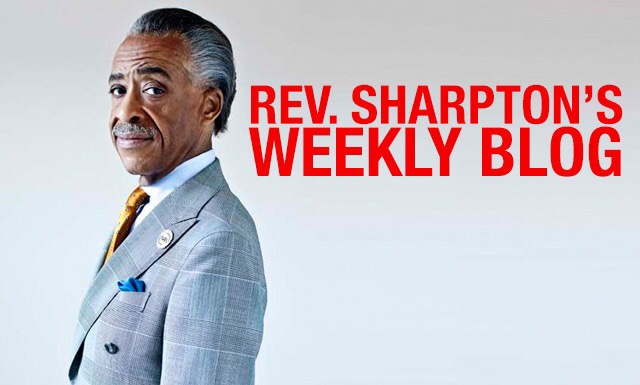Rev. Al Sharpton's Weekly Blog
Will the South Teach the North About Police Reform?
—
As I mounted the pulpit at Charity Missionary Baptist Church in North Charleston, South Carolina on Sunday to preach the morning sermon and address the senseless and ruthless shooting by police of Walter Scott, I looked at Mayor Keith Summey, Police Chief Eddie Driggers and an array of media that came to hear my comments. I thought about how I just left our National Action Network annual convention where over four days thousands gathered and among them were the wife and mother of Eric Garner. Garner was choked to death on tape as he helplessly yelled 'I can't breathe' over and over again. Scott was shot in the back and it was also captured on tape. In liberal New York, the DA refused to charge the officer that choked Garner, and I was condemned for telling police Commissioner Bill Bratton that this won't stop until we perp walk officers just like others accused of crimes. In North Charleston, South Carolina, in the heart of the deep south where a confederate flag is still flying over the state capitol, a southern White Mayor and Police Chief arrested officer Michael Slager and charged him with the murder of Walter Scott. He is currently sitting in jail without bail. Perhaps the deep South can teach the liberal North about true police reform and justice.
National Action Network has a chapter in North Charleston that is led by Rev. Nelson Rivers and Rev. Johnson who have both been involved with the Walter Scott case even prior to the video surfacing. They told me that the Mayor and Police Chief are far from perfect, and neither of them have enjoyed the best relationship with the Black community. But when the Mayor stood up and said "wrong is wrong", he raised the bar for Mayors (and Police Chiefs) across the country to stop politicizing what prima facie charging is all about. We are a long way from justice and this case will have to work its way through the prosecutor, jury selection and trial, but just the contrast of this tragic incident and that of Garner's death and others is remarkable. We have seen case after case in the North and the Midwest dismissed, and those that stood for them were castigated; now in the heart of the old Confederacy, we see them follow the rule of law. That is, an officer must be held to the same standards as everyone else, and we prosecute cases and then let a jury decide.
Sometimes, examples are set in the least obvious places. Who would have thought that we may be able to turn the corner on how we deal with criminal acts committed by police by unlikely people in an unlikely place? From Charleston to Oklahoma to across this country, we are seeing cases of police brutality and killings continue to rise. This is a national issue, and we need national solutions. First and foremost, we need national legislation on body cameras, and we need the Justice Department to take charge of police cases so that they are taken out of the hands of local prosecutors and local politics. We need police to understand that if they break the law, they will go to jail, and that will be enforced by the Justice Department and not by a twisted game of Russian roulette if someone happens to film it.
Change often emerges from where we don't expect it. It can take a horrific calamity for the most stubborn to recognize a problem exists, and agree to find true sustainable solutions. It appears that the video footage of Walter Scott's death has even convinced former New York City Police Chief Ray Kelly that body cameras are necessary for officers. He called this incident a "game-changer." If someone like Kelly, who was such an ardent opponent of body cameras, can shift his attitude on the subject, there is hope that many others will do the same. People of good conscience -- both on the right and left -- have seen this video and know that it is beyond time to take action. Body cameras are a common sense first step that will protect both citizens and good cops.
At our National Action Network convention, we honored the legacy of Viola Liuzzo and gave her an award in memoriam for her fearless work and dedication to the cause of civil rights. In 1965, she left the North and headed South to push for voting rights in Selma, Alabama. She was killed by Klansmen. Liuzzo went where the need was greatest and fought for the voiceless among us and she, like others, gave the ultimate sacrifice.
Fifty years later, as I sat waiting to preach on Sunday, I began thinking that maybe Southerners have to come North now to teach liberals how not to excuse police in prima facie case arrests. In 2015, the North may have to take notes from the South on what true police reform looks like.